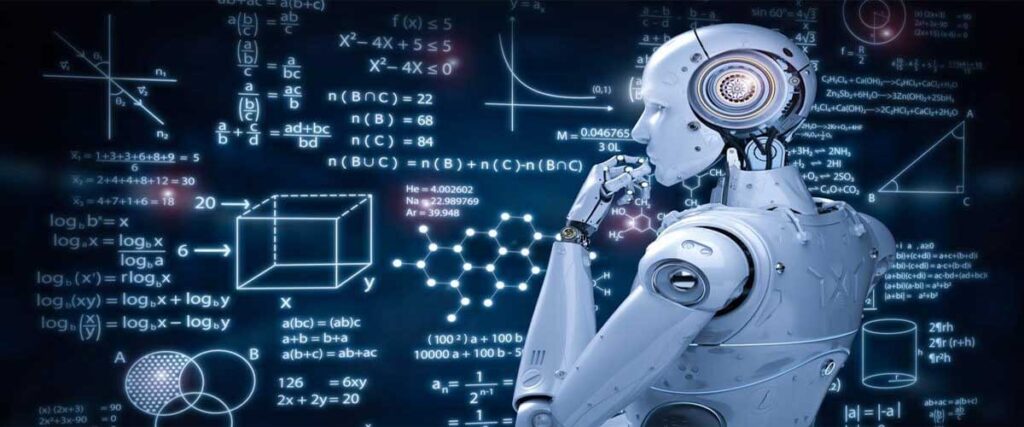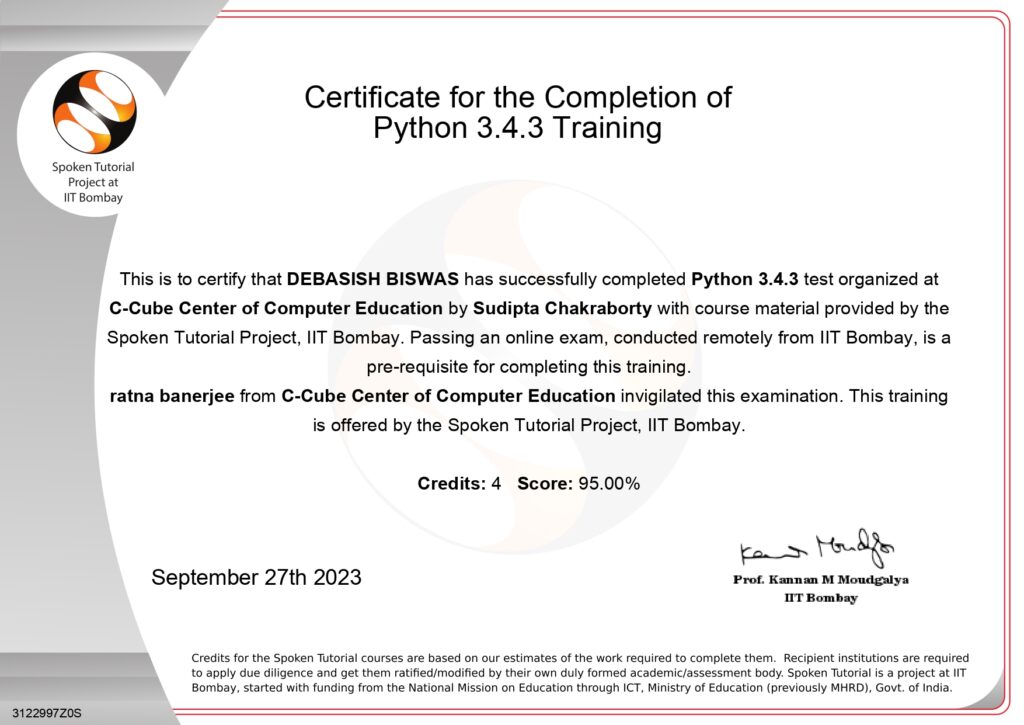9007116752
c3creativedomain@gmail.com

C-Cube
Centre of Computer Education
- Home
- Courses
- Best Data Science Training Institute
- Data Science with R
- Financial Data Analytics
- Best Data Analytics Training Centre in kolkata
- Full Stack Development Course Kolkata
- Website Development
- Android App Development
- Programming Training Institute
- Institute For Cyber Security kolkata
- Data Structure & Algorithm
- Digital Marketing Course
- Marketing Analytics Training in Kolkata
- Share Trading Institute
- F.A & Ms-Office
- About Us
- Blog
- Gallery
- Contact Us

Best Data Science Training Institute - Join our Course Today
What is Data Science & Machine Learning course?
The Best Data Science Training Institute helps you learn how to analyze and use data effectively. It covers important topics like statistics, programming, and machine learning. So This Data Science Training course teaches tools like Python, R, and SQL to work with data and gain best knowledge and skills. Basically a Top Data Science Course prepares you for jobs in fields like IT, finance, and healthcare. Furthermore It is perfect for anyone who wants to build a career in data science and stay ahead in the growing data-driven world. So join our Best Data Science Training Bootcamp now and excel in your Data Science Training & Development Career with hands-on Training , Certification and Internship offer.
Data science Training is the process of analyzing data to find patterns and insights. This course will help you to master Data Science tools like statistics, programming, and algorithms. The goal of this Training is to solve problems or make better decisions using data.
Machine learning (ML) is a part of data science. It involves teaching computers to learn from data and improve over time. ML helps in tasks like predictions, recognizing images, or recommending products.
Need for Best Data Science Training & ML course
The demand for Best Data Science Training is increasing as businesses rely on data to make smart decisions. As a result this Data Science Training course helps you learn how to analyze data, find patterns, and solve problems. Furthermore it also covers tools like Python, R, and SQL, which are essential for working with data. Thus with data science skills, you can work in high-demand fields like IT, healthcare, and finance.
A Top Data Science and ML Course also teaches machine learning, where computers learn from data to make predictions. This is useful for tasks like fraud detection, product recommendations, and more. Learning these skills can open doors to exciting career opportunities. It is a must for anyone looking to grow in today’s data-driven world.
What does this Data Science Training course offer?
- Complimentary Python Programming Bootcamp
- Designed for Working Professionals and Students
- 20+ Case Studies and 5+ Industry Projects
- Dedicated Student Support
- Exclusive Job Assistance
- Live coding classes and profile building workshops
- Programming – Python , SQL
- Statistics – Linear Algebra , Probability & Statistics
- Data Manipulation & Analysis – Data Wrangling , Data Visualization , Exploratory Data Analysis (EDA):
- Machine Learning Algorithms – Supervised Learning , Unsupervised Learning:
- Opportunity to wok on live-projects as part of Internship on reputed Companies.
- Internship work certificate
- Certification on Python from IIT Bombay
- Certification on Diploma in Data Science & ML from Central Govt. of India
Both the below mode of Training is available.
Online Mode – Live Class
Offline Mode
Course Curriculum for Data Science Training
Data Science with Python
Full Course for Beginners
- Python Introduction
- Types
- Expressions and Variables
- String Operations
- Lists and Tuples
- Sets
- Dictionaries
- Conditions and Branching
- Loops
- Functions
- Objects and Classes
- Array shapes and axes
- Arithmetic Operations
- Conditional Logic
- Common Mathematical & Statistical Functions
- Indexing & Slicing
- Scalars & Vectors
- Dot Product of Two Vectors
- Matrix
- Matrix Operations
- Transpose of Matrix
- Importance of Statistics with Respect to Data Science
- Levels of Measurement
- Measures of Central Tendency
- Measure of Dispersion
- Measures of Shape
- Covriance & Correlation
- Introduction to Pandas
- Pandas Series
- Pandas Dataframes
- Common Functions in Pandas
- Pandas Functions of Data Statistical Function, Window Function
- Categorical Data
- Working with Text Data
- Iteration
- Sorting
- Plotting with Pandas
- Data Importing and Exporting
- Data Cleaning and Preprocessing
- Data Manipulation
- Exploratory Data Analysis (EDA)
- Handling Time Series Data
- Data Export
- Handling Missing Data
- Removing Duplicates
- Data Type Conversion
- Renaming Columns
- Filtering and Subsetting Data
- String Manipulation
- Handling Outliers
- Merging and Joining DataFrames
- Pivoting and Reshaping Data
- Grouping and Aggregation
- Matplotlib Python Intro
- MatplotlibPyplot
- Matplotlib Plotting
- Matplotlib Markers
- Matplotlib Line
- Matplotlib Labels
- Matplotlib Grid
- Matplotlib Subplots
- Matplotlib Scatter
- Matplotlib Bars
- Matplotlib Histograms
- Matplotlib Pie Charts
- Dynamic Visualizations, Scipy
Quick Contact Form
Machine Learning
with Python
Full Course for Beginners & Advance Level
- Machine Learning Introduction.
- Types of Machine Learning.
- Introduction of Packages used in Machine Learning.
- Machine Learning vs Statistical Modelling
- Supervised vs Unsupervised Learning
- Supervised Learning Classification
- Unsupervised Learning
- K-Nearest Neighbors
- Decision Trees
- Random Forests
- Reliability of Random Forests
- Advantages & Disadvantages of Decision Trees
- Regression Algorithms
- Model Evaluation
- Model Evaluation: Overfitting & Underfitting
- Understanding Different Evaluation Models
- K-Means Clustering plus Advantages & Disadvantages
- Hierarchical Clustering plus Advantages & Disadvantages
- Measuring the Distances Between Clusters – Single Linkage Clustering
- Measuring the Distances Between Clusters – Algorithms for Hierarchy Clustering
- Density-Based Clustering
- Dimensionality Reduction: Feature Extraction & Selection
- Collaborative Filtering & Its Challenges
Tools & Technologies for Data Science Training course

Eligibility Criteria
- Graduates or Colleges Students from any discipline
- No prior work experience required
- No prior coding experience or tech know-how required
Best Suited For
- IT Professionals
- Recent Graduates
- Students pursuing career in Btech,BCA ,MCA , MBA , BBA or Bachelor’s Degree in Computer , Mathematics , Science , Economics
Data Science & ML Certification
IIT Bombay Certification for Python

Central Govt. Certification for
Data Science & ML
National Board of Computer Education is a multi-award winning educational content portal. All the courses are launched after an initial survey. The courses fulfill the requirement of the students. To gain professional qualification, certification and extra classes in career orientation and self-development. After completion of each module the performance of the students is monitored through regular tests to develop their skills. That the students should appear successfully. In the Job market and handle the situation confidently.Our students are employed in reputed organization both in India and Abroad. The key to success in ensuring quality training by the experts. Provide education for the rural youth enabling him to play a part of the global development.

Data Science and ML Program FAQs
Data science is a broad, multidisciplinary field that extracts value from today’s massive data sets. It uses advanced tools to look at raw data, gather a data set, process it, and develop insights to create meaning. Areas making up the data science field include mining, statistics, data analytics, data modeling, machine learning modeling and programming.
Machine learning (ML) is a subset of artificial intelligence (AI) that focuses on learning from what the data science comes up with. It requires data science tools to first clean, prepare and analyze unstructured big data. Machine learning can then “learn” from the data to create insights that improve performance or inform predictions. Machine learning works on a known problem with tools and techniques, creating algorithms that let a machine learn from data through experience and with minimal human intervention. It processes enormous amounts of data a human wouldn’t be able to work through in a lifetime and evolves as more data is processed.
You must meet the following requirements to be admitted to the Data Science and ML Course :
- A bachelor’s degree/ Class 12 passed with a grade point average of at least 50%.
- Understanding the fundamentals of coding and math.
A data science course can help you in your career in many ways:
Data analysis skills: A data science course can help you develop the skills needed to analyze and interpret data, which is essential in many industries. You can use these skills to identify patterns, draw insights, and make data-driven decisions.
Machine learning skills: A data science course can also help you learn how to build machine learning models, which can be used to automate decision-making and prediction tasks. These skills are in high demand in many industries, including healthcare, finance, and e-commerce.
Technical skills: A data science course can help you develop technical skills such as programming, data manipulation, and data visualization. These skills are highly valued in the job market, as they are essential for working with data and building intelligent systems.
Career opportunities: The demand for data scientists is growing rapidly, and a data science course can open up many career opportunities in fields such as data analysis, machine learning engineering, and data science consulting.
Higher earning potential: Data scientists are among the highest-paid professionals in the tech industry, and a data science course can help you develop the skills needed to earn a high salary.
A machine learning course can help you in your career in many ways:
Data analysis skills: A machine learning course can help you develop the skills needed to analyze and interpret data, which is essential in many industries. You can use these skills to identify patterns, draw insights, and make data-driven decisions.
Machine learning skills: A machine learning course can help you learn how to build machine learning models, which can be used to automate decision-making and prediction tasks. These skills are in high demand in many industries, including healthcare, finance, and e-commerce.
Technical skills: A machine learning course can help you develop technical skills such as programming, data manipulation, and data visualization. These skills are highly valued in the job market, as they are essential for working with data and building intelligent systems.
Career opportunities: The demand for machine learning engineers and data scientists is growing rapidly, and a machine learning course can open up many career opportunities in fields such as machine learning engineering, data science consulting, and AI research.
Higher earning potential: Machine learning engineers and data scientists are among the highest-paid professionals in the tech industry, and a machine learning course can help you develop the skills needed to earn a high salary.
The Data Science program is ideal for individuals who are interested in solving complex problems using data-driven approaches. This program is suitable for individuals who have a background in mathematics, statistics, computer science, or other related fields and are interested in applying their skills to analyze and interpret large datasets.
The program is also suitable for professionals who want to upskill and advance their careers in the field of data science. This includes individuals working in industries such as finance, healthcare, marketing, and technology, as well as those working in government and non-profit organizations.
Overall, the Data Science program is ideal for individuals who have a passion for working with data and want to develop the skills and knowledge required to analyze, interpret, and visualize complex datasets.
A data science course can provide a wide range of skills related to working with data, including:
Data analysis: You will learn how to use tools and techniques to explore and analyze data, identify patterns, and draw insights.
- Statistics : You will learn statistical concepts such as probability, hypothesis testing, and regression analysis to make predictions and decisions based on data.
- Machine learning : You will learn how to build and evaluate models that can automatically learn from data, make predictions, and identify patterns.
- Programming : You will learn how to use programming languages such as Python or R to manipulate data, build models, and visualize results.
- Data visualization : You will learn how to use tools such as graphs, charts, and interactive dashboards to present data in a clear and compelling way.
- Big data technologies : You will learn how to work with large and complex data sets using technologies such as Hadoop and Spark.
- Business and communication skills : You will learn how to communicate findings and insights to non-technical stakeholders, understand business requirements, and make data-driven decisions.
A machine learning course can provide a wide range of skills related to building intelligent systems that can learn from data, including:
- Data preparation : You will learn how to clean, preprocess, and transform data to prepare it for use in machine learning models.
- Machine learning algorithms : You will learn about a variety of machine learning algorithms such as linear regression, decision trees, random forests, and neural networks.
- Model selection and evaluation : You will learn how to evaluate the performance of machine learning models and select the best model for a given task.
- Feature engineering : You will learn how to extract and create features from raw data to improve the performance of machine learning models.
- Deep learning : You will learn how to build and train deep neural networks for tasks such as image recognition and natural language processing.
- Model deployment : You will learn how to deploy machine learning models into production environments.
- Ethics and bias in machine learning: You will learn about the ethical and social implications of machine learning, as well as techniques for mitigating bias in models.